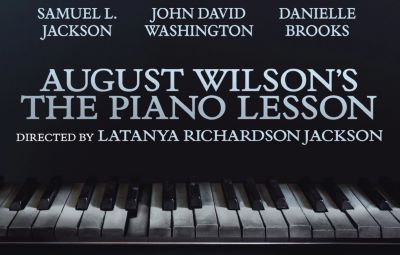A PIANO PLAYED WELL NEEDS FINE TUNING
There’s much to learn in August Wilson’s brilliant play The Piano Lesson. There’s no little old lady running scales but there doesn’t need to be. Because the piano itself and its circumstance – how it came to be, who suffered for it, who died because of it, who owns it, who is owned by it – are all lessons the instrument itself provides. And in those lessons, Wilson illustrates an intrinsic part of the African American experience – a legacy of being owned and struggling for ownership – within a brutal system that purposefully disadvantages African American people. Though the surface plot is fairly simple — an estranged brother and sister argue over whether to sell or keep a beautiful piano that has been in the family for generations – that simplicity is very deceptive. For the piano is not only a valuable instrument but a container for this family’s ancestors, endowing it with the power to bring those ghosts and other spirits into the present – continuing a complex journey deeper and deeper into the consequences of people as property. However, in the current Broadway revival of The Piano Lesson at the Ethel Barrymore Theater, director Latanya Richardson Jackson’s uneven hand seems content to keep the proceedings on a surface level – delivering a safe, muted and sometimes confusing interpretation of this Wilson classic. Even with a talented cast onboard, this Piano plays much more flat than sharp.
Samuel L. Jackson and John David Washington
Set in 1936 Pittsburgh, thirty-five-year-old Bernice and her young daughter live with her uncle in his house. His name is Doaker Charles. Bernice was widowed three years prior when her young husband was shot by white men during a botched lumber theft, while accompanied by her brother Boy Willie and his friend Lymon. From Boy Willie’s perspective, this was not a theft but a widespread if unacknowledged practice that allowed workers (mostly white ones) to sometimes skim supplies. It only became a problem when the white managers saw black men do it. Boy Willie and Luther both served time on a harsh, Mississippi work-farm because of the incident. Berniece is in possession of the family heirloom piano that contains carvings of family members, which was done to appease the wife of the man Sutter, who owned her great-grandparents during slavery. In 1911, Berniece’s father stole the piano back from the Sutter family. He was killed in retaliation. As the play begins, thirty-year-old Boy Willie and Lymon unexpectedly drive up from Mississippi to Doaker’s house. Boy Willie wants to sell the piano to help buy land now freed up by the recent mysterious death of the current Sutter patriarch, as the Charles family once worked that same land while slaves. Berniece adamantly refuses, citing the family legacy of pain and suffering ensconced within the piano. Also, Sutter’s ghost has arrived at Doaker’s house to complicate matters. The presence of ghosts, legacy, ownership, survival, property, incarceration, exploitation, murder and self-determination are debated and explored throughout the show, resulting in a stunning climax.
Danielle Brooks
However, in this production, the ending is more confusing than stunning as Richardson keeps her cast moving at such a pace there rarely seems time for them to make those deeper connections that engage the underlying themes of the show. They are excellent with the speaking of Wilson’s text, but what’s underneath? Those moments are few and far between, softening Wilson’s work. Visually, Richardson’s staging is serviceable but rarely takes advantage of Beowulf Boritt multi-level and impressive house set, tending to keep most action on a straight, downstage line.
John David Washington and Samuel L. Jackson
As Boy Willie, John David Washington is strong and impressive. He first enters stage at full force but maintains that cadence throughout the show so we get mostly bluster from his character, not the build and wins and losses as he argues his case. Danielle Brooks creates a Berniece who is strong, caring, smart and funny. Her unexpectedly falling for Lymon’s charms is a great scene within itself but comes somewhat from left field as she, again, doesn’t seem to have been allowed the opportunity to build the emotional defense needed for that surrender. As Lymon, understudy Doron JePaul Mitchell strongly holds his own with the regular cast, creating a compelling and charming young man.
Ray Fisher, Trai Byers, and Samuel L. Jackson
As Doaker, Samuel L. Jackson proves to be as fine a stage actor as he is a film actor, creating a Doaker who may have some of the familiar Jackson-isms that we know from his movies but is clearly based in Wilson’s writing, not Jackson’s film persona. April Matthis delivers a hilarious turn as girl-for-the-night Grace and Michael Potts’ Whining Boy is completely that larger than life musician/hustler who’s seen it all and has lived to tell the tale.
Samuel L. Jackson and Ray Fisher
A safe August Wilson production is better than no production at all. And though there could have been much more depth revealed and under-lying connections made, this revival of The Piano Lesson still reminds us of the magnitude of Wilson’s talent and vision. The depth of which is evident, even on a surface level.
photos by Julia Cervantes
The Piano Lesson
Ethel Barrymore Theatre, 243 W 47th Street
ends on January 8, 2022 EXTENDED to January 29, 2023
PianoLessonPlay.com
instagram.com/thepianolessonplay/
twitter.com/PianoLessonPlay
